Views of and experiences with parenthood differ in particular ways among racial and ethnic groups in the United States. Black and Hispanic parents are more likely than White and Asian parents to say being a parent is the most important aspect of who they are as people, though large majorities of all groups say it is at least one of the most important aspects. And Black parents are more likely than White, Hispanic and Asian parents to give themselves high marks for the job they are doing as a parent.
The worries parents have also vary by racial and ethnic group. Hispanic parents are more likely than White, Black and Asian parents to worry about their children facing nearly every issue asked about in the survey, including bullying, problems with drugs and alcohol, teen pregnancy and certain physical threats. And while about a quarter of Black and Hispanic parents say they are extremely or very worried that their children might get in trouble with the police, roughly one-in-ten Asian parents and an even smaller share of White parents share this concern.
Looking ahead to when their children are adults, Asian parents stand out as the most likely to say it is extremely or very important to them that their children earn a college degree and get married. About nine-in-ten or more across racial and ethnic groups place a high level of importance on their children being honest and ethical as adults, but White parents are the most likely to say this is extremely important. In turn, a larger share of Black parents than those who are White, Hispanic or Asian say it’s extremely important to them that their children be ambitious as adults.
Black, Hispanic parents are more likely than White, Asian parents to see being a parent as the most important aspect of who they are
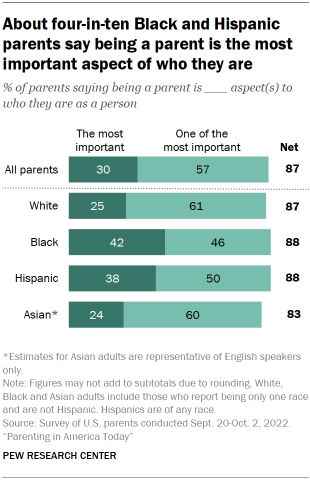
Across all major racial and ethnic groups, overwhelming majorities of those with children younger than 18 say being a parent is one of the most important aspects or the most important aspect of who they are as a person. But far larger shares of Black and Hispanic parents than White and Asian parents say it is the most important aspect. About four-in-ten Black (42%) and Hispanic (38%) parents say this, compared with 25% of White and 24% of Asian parents.
There are also some key differences in how parents across racial and ethnic groups rate the job they’re doing as parents. Black parents are the most likely to rate themselves highly, with about seven-in-ten (71%) saying they are doing at least a very good job, including 29% who say they are doing an excellent job. About two-thirds of White parents (66%) and smaller majorities of Hispanic (59%) and Asian parents (56%) say they are doing at least a very good job, with only 13% of White parents and 16% each among Hispanic and Asian parents saying they are doing an excellent job.
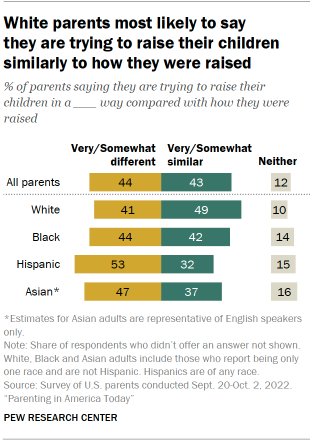
In reflecting on how they’re raising their own children compared with how they were raised, White parents are the most likely to say they are trying to raise their children similarly: About half (49%) say this compared with 42% of Black parents, 37% of Asian parents and 32% of Hispanic parents. Hispanic parents (53%) are more likely than White (41%) and Black (44%) parents to say they are trying to raise their children differently; some 47% of Asian parents say the same.
Related: How Today’s Parents Say Their Approach to Parenting Does – or Doesn’t –Match Their Own Upbringing
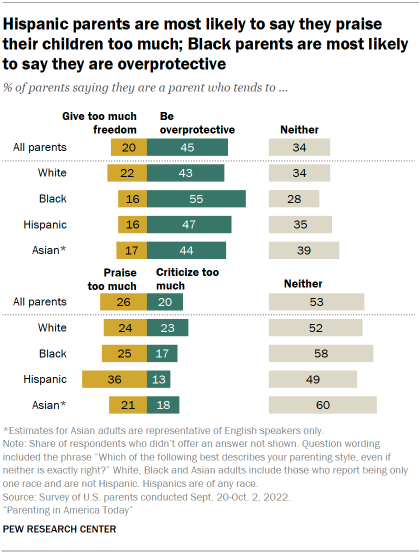
When asked about their parenting style, parents across racial and ethnic groups are more likely to describe themselves as overprotective than to say they give their children too much freedom. Black parents are especially likely to see themselves as overprotective: 55% describe themselves this way, followed by 47% of Hispanic parents, 44% of Asian parents and 43% of White parents.
There is less consensus when it comes to other aspects of parenting styles, but some interesting differences emerge. Hispanic parents (36%) are more likely than White (24%), Black (25%) and Asian (21%) parents to say they praise their children too much rather than criticizing them too much, but about half or more across racial and ethnic groups say neither of these describes their parenting style. And while a larger share of White parents say they tend to give in too quickly (39%) than say they tend to stick to their guns too much (29%), Black, Hispanic and Asian parents are more evenly divided between these two approaches.
Black, Hispanic parents are more likely than White, Asian parents to say parenting is always rewarding, enjoyable
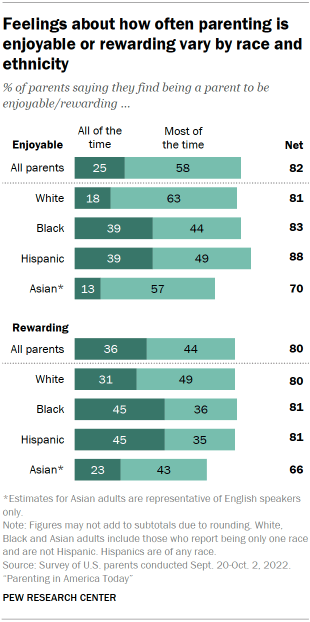
About two-thirds of White and Asian parents (65% each) say being a parent has been a lot or somewhat harder than expected; 58% of Hispanic parents and 53% of Black parents say the same.
For the most part, parents across racial and ethnic groups find being a parent to be enjoyable and rewarding at least most of the time, but Black and Hispanic parents are more likely than White and Asian parents to say this is the case all of the time. Some 45% of Black and Hispanic parents say being a parent is rewarding all of the time, compared with 31% of White parents and 23% of Asian parents. And while about four-in-ten Black and Hispanic parents find being a parent to be enjoyable all of the time (39% each), far smaller shares of White (18%) and Asian (13%) parents say the same.
Fewer than half of parents across racial and ethnic groups say being a parent is stressful or tiring all or most of the time. While there are no significant differences in the shares of White, Black, Hispanic or Asian parents who say parenting is stressful, White parents are the most likely to say it is tiring all or most of the time. Some 46% of White parents say this, compared with 33% of Black parents and 36% each among Hispanic and Asian parents.
White parents are the most likely to feel judged by other parents in their community
There are also some differences in the extent to which parents across racial and ethnic groups feel judged by certain people for how they parent their children. Asian parents (53%) are more likely than their White (44%), Black (41%) and Hispanic (41%) counterparts to say they feel judged by their own parents at least sometimes. And higher shares of Asian (47%) and White (43%) parents than of Black (32%) and Hispanic (37%) parents say they feel judged by their spouse or partner’s parents at least sometimes (among those who are married or living with a partner).
Four-in-ten White parents say they at least sometimes feel judged by other parents in their community for how they parent their children. This is significantly higher than the shares among Asian (31%), Hispanic (28%) and Black (24%) parents.
Asian parents place more importance than other parents on college graduation, marriage for their children
Large majorities ranging from 87% to 90% across racial and ethnic groups say it’s extremely or very important to them that their children be financially independent and that they have jobs or careers they enjoy as adults. Far smaller shares across groups say the same about their children graduating from college, getting married and having children, but there are some differences in the importance White, Black, Hispanic and Asian parents place on these goals.
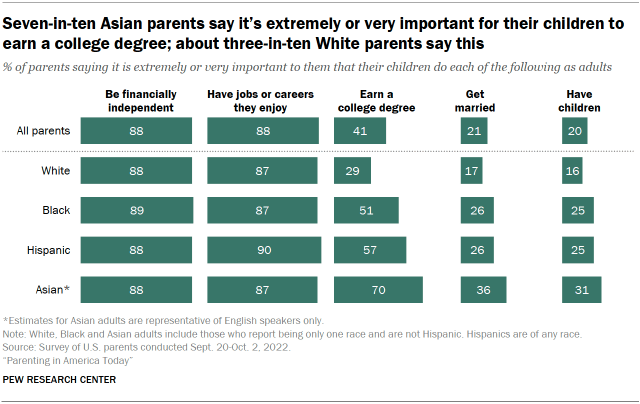
Seven-in-ten Asian parents say it is extremely or very important to them that their children earn a college degree, compared with 57% of Hispanic parents, 51% of Black parents, and just 29% of White parents. Asian parents are also the most likely to place a lot of importance on their children getting married someday: 36% say this is extremely or very important to them, followed by about a quarter of Black and Hispanic parents (26% each) and just 17% of White parents.
Some racial and ethnic differences also emerge when it comes to the kind of people parents hope their children will become when they grow up. While majorities across groups say it’s extremely or very important to them that their children grow up to be honest and ethical, hardworking, and ambitious, and that they grow up to be someone who helps others in need and who is accepting of people who are different from them, some groups are more likely than others to see these as extremely important.
White parents are the most likely to say it is extremely important to them that their children be honest and ethical as adults (70% say this vs. 60% of Black parents, 62% of Hispanic parents, and 58% of Asian parents). In turn, Black parents are the most likely to say it is extremely important to them that their children be ambitious as adults (42% say this vs. 26% of White parents, 24% of Hispanic parents and 20% of Asian parents). And larger shares of White (44%) and Black (46%) parents than Hispanic (37%) and Asian (36%) parents say the same about their children growing up to be accepting of people who are different from them.
Fewer than half of parents across racial and ethnic groups say it’s extremely or very important for them that their children have religious or political beliefs that are similar to theirs. In fact, only between 15% and 17% of White, Black, Hispanic and Asian parents say it’s extremely or very important that their children share their political views. Four-in-ten Black parents (40%) and a similar share of Hispanic parents (39%) say it is at least very important to them that their children have similar religious beliefs to theirs when they grow up; about a third of White and Asian parents (32% each) say the same.
Hispanic parents express higher levels of concern about their children experiencing a variety of challenges
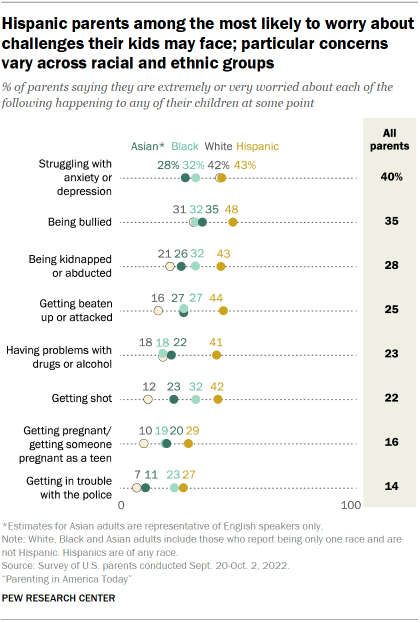
Parental worries also tend to vary by race and ethnicity. Hispanic parents express more concern than White, Black and Asian parents on six of the eight items asked about in the survey. Specifically, Hispanic parents are the most likely to say they are extremely or very worried about each of the following happening to their children at some point: being bullied, being kidnapped or abducted, getting beaten up or attacked, having problems with drugs or alcohol, getting shot, and getting pregnant or getting someone pregnant as a teenager. A different Pew Research Center survey found that Hispanic parents of teens were also more likely than Black and White parents to express high levels of concern about what their children might experience on social media (there weren’t enough Asian parents in that survey to analyze separately).
Concerns about mental health are felt more acutely by White and Hispanic parents: 42% of White parents and 43% of Hispanic parents say they are extremely or very worried their children might struggle with anxiety or depression at some point, compared with 32% of Black parents and 28% of Asian parents.
Black parents (32%) are less likely than Hispanic parents (42%) to say they are extremely or very worried about their children getting shot, but Black parents are more likely than Asian (23%) and White (12%) parents to say this. And while similar shares of Black (23%) and Hispanic (27%) parents say they are extremely or very worried about their children getting in trouble with the police, just 11% of Asian parents and 7% of White parents say the same.
Among Hispanic parents, those who are foreign born are more likely than those who were born in the United States to say they are extremely or very concerned about nearly all of the items included in the survey by margins ranging from 10 percentage points (being kidnapped or abducted) to 24 points (getting beaten up or attacked and having problems with drugs or alcohol).3 The only exception is on concerns about mental health: 46% of foreign-born and 39% of U.S.-born Hispanic parents are extremely or very concerned about this, a difference that is not statistically significant.



